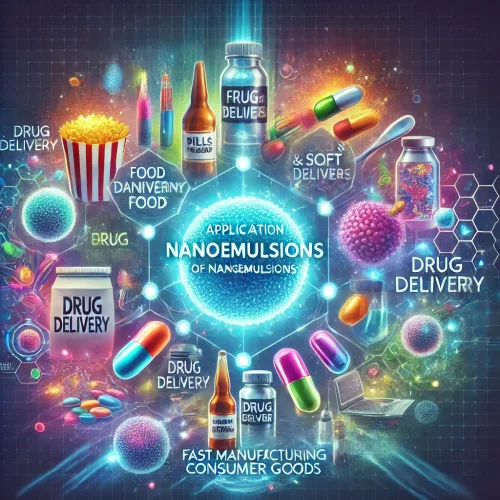
Nanoemulsions in FMCG: Transforming Pharmaceuticals, Food, and Personal Care
Skills you will gain:
Nanoemulsions are finely dispersed emulsions with droplet sizes typically in the range of 20-200 nanometers. Due to their small size, they offer unique advantages such as enhanced bioavailability, improved solubility of hydrophobic drugs, and increased stability of active ingredients. In the pharmaceutical industry, nanoemulsions are revolutionizing drug delivery systems, enabling more effective and targeted treatments with reduced side effects. In the food and personal care industries, nanoemulsions are being used to create products with better texture, longer shelf life, and improved sensory properties. For instance, nanoemulsions can enhance the delivery of nutrients in functional foods and improve the absorption of active ingredients in skincare products. This program will cover the fundamentals of nanoemulsions, their formulation techniques, characterization methods, and various applications across the FMCG sector.
Aim: The program aims to provide an in-depth understanding of Nanoemulsions and their transformative impact on the FMCG sector, focusing on pharmaceuticals, food, and personal care industries. Participants will explore the science behind nanoemulsions, their applications, and the latest advancements driving innovation in these fields.
Program Objectives:
- Understand the basic principles of nanoemulsions and their properties.
- Learn formulation techniques for creating stable nanoemulsions.
- Explore the applications of nanoemulsions in pharmaceuticals, food, and personal care.
- Gain insights into the latest advancements and trends in nanoemulsion technology.
- Develop skills to analyze and characterize nanoemulsions.
What you will learn?
Week 1: Introduction and Fundamentals of Nanoemulsions
- Introduction to Nanoemulsions:
- Definition and basic concepts
- Historical development and significance
- Fundamental Properties:
- Physicochemical properties
- Droplet size and stability
- Preparation Methods:
- High-energy methods (high-pressure homogenization, ultrasonication)
- Low-energy methods (phase inversion, spontaneous emulsification)
- Characterization Techniques:
- Particle size analysis (DLS, electron microscopy)
- Zeta potential
- Rheological properties
Week 2: Nanoemulsions in Pharmaceuticals
- Drug Delivery Systems:
- Enhanced bioavailability and solubility of hydrophobic drugs
- Controlled and targeted drug delivery
- Formulation Strategies:
- Selection of emulsifiers and surfactants
- Stability considerations
- Case Studies and Applications:
- Nanoemulsions in cancer therapy
- Use in vaccines and biologics
- Regulatory and Safety Aspects:
- Regulatory requirements and compliance
- Safety evaluation and Toxicology
Week 3: Nanoemulsions in the Food Industry
- Functional Foods and Nutraceuticals:
- Encapsulation of bioactive compounds
- Improved nutrient delivery
- Formulation Challenges:
- Stability in different food matrices
- Impact on sensory properties and consumer acceptance
- Applications and Case Studies:
- Nanoemulsions in beverages and dairy products
- Fortification of food with vitamins and antioxidants
- Regulatory and Safety Aspects:
- Food safety regulations
- Risk assessment and consumer health
Week 4: Nanoemulsions in Personal Care and Cosmetics:
- Skin Care and Cosmetic Applications:
- Enhanced delivery of active ingredients
- Improved product stability and texture
- Formulation Techniques:
- Selection of appropriate emulsifiers and stabilizers
- Stability testing and shelf-life assessment
- Case Studies and Product Development:
- Nanoemulsions in anti-aging products
- Use in sun protection and moisturizers
- Regulatory and Market Trends:
- Regulatory landscape for personal care products
- Emerging trends and consumer preferences
- Challenges in scaling up nanoemulsion production
- Case studies of successful commercialization
- Future Trends and Research Directions:
- Novel emulsifiers and formulation techniques
- Nanocarriers and hybrid systems
- Cutting-edge research and developments
- Potential future applications in various industries
Intended For :
- Pharmaceuticals: Bachelor’s or Master’s degree in Pharmacy, Pharmaceutical Sciences, or related fields.
- Food Industry: Bachelor’s or Master’s degree in Food Technology, Nutrition, or related fields.
- Personal Care: Bachelor’s or Master’s degree in Cosmetic Science, Chemistry, or related fields.
- Nanotechnology and Material Science: Bachelor’s or Master’s degree in Nanotechnology, Material Science, or related fields.
Career Supporting Skills

